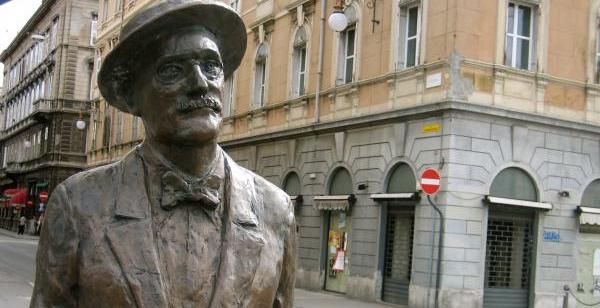James Joyce's Ulysses was published in Paris in 1922. The novel harked back to the Symbolist movement in France, but it was also immensely innovative and is widely regarded as a modernist classic.
Ulysses is a parody of Homer's poem The Odyssey, 'reincarnating' Odysseus as a Jewish advertisement canvasser called Leopold Bloom. The book also reintroduces readers to Stephen Dedalus (see A Portrait of the Artist as a Young Man, 1916).
The ten-year quest described in Homer's text is telescoped into the events of a single day, 16th June 1904 – a special one for the author, because it was the anniversary of his first date with Nora Barnacle. She provided the inspiration for the portrayal of Bloom's wife, Molly.

James Joyce depicted in a Trieste statue
In Joyce's novel trivial, everyday events happening to ordinary people take on an epic significance. Bloom wanders through the Dublin streets, encountering a host of striking characters. Dedalus is also out-and-about in the city, and eventually their paths cross. Joyce's use of the stream-of-consciousness technique enables us to follow the flow of their inner thoughts and feelings.
Every year on 16th June, fans of Joyce's writing gather to celebrate 'Bloomsday'. His fiction has had an enormous impact, as these quotes demonstrate:
Leslie Fiedler: 'Ulysses was for my youth and has remained for my later years not a novel at all, but a conduct book, a guide to salvation through the mode of art, a kind of secular scripture.'
T.S. Eliot: 'It is the book to which we are all indebted and from which none of us can escape.'
Rate and Review
Rate this article
Review this article
Log into OpenLearn to leave reviews and join in the conversation.
Article reviews
Thanks for your question. This is a short article. You might be interested in this podcast about James Joyce: http://www.open.edu/openlearn/history-the-arts/james-joyces-dublin
Kind regards,
The OpenLearn Team